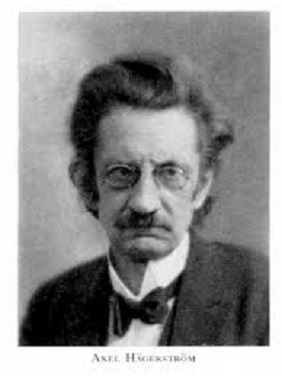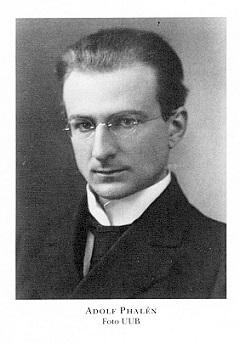Lecture series
Hägerström Lectures
The initiative for the series of "Hägerström Lectures" was taken by the former professor of theoretical philosophy Stig Kanger. The idea was to invite an internationally known philosopher for a week to give five lectures with a common theme and hereby meet the teachers and students at the Department for less formal discussions. The series began in 1971 with Konrad Marc-Wogau (also a former professor of theoretical philosophy in Uppsala). The list of speakers include many of the twentieth century's most eminent philosophers such as W.V. Quine, David Lewis, Alonzo Church, Amartya Sen, Donald Davidson, Martha Nussbaum and Hilary Putnam.
The Hägerström Lectures were given on a yearly basis until 2009, between 2009 and 2022 every two years, and from 2022 again on a yearly basis. As from 2017 the number of lectures are three.
All lectures
2024 Mary Margaret McCabe
'Common among friends': Socratic Method and Conversational Justice
2023 Robert Hopkins
2022 Wlodek Rabinowicz
Incommensurability in Value, Put to Work
2020 Karen Bennett (moved to 2021)
Building, Causing, and the Nonfundamental
2017 Kendall Walton
Abstraction and Aboutness in the Arts (copy of original web page)
2015 Rae Langton
Accomodating Injustice (copy of original web page)
2013 Timothy Williamson
Logic as Metaphysics
2011 Michael J. Zimmerman
Reconsidering the Moral Significance of Ignorance
2009 Bas van Fraassen
The Empirist Alternative
2008 Simon Blackburn
Pragmatists versus Frege: from Berkeley to Putnam
2007 Allan Gibbard
Meaning as a Normative Concept
2006 Ian Hacking
Five lectures: Kinds of people: moving targets; Autism: the very earliest days; Autism now; Obesity – where did the Body-Mass Index come from?; Nietzsche: “Unspeakably more depends on what things are called than on what they are”
2005 John McDowell
Mind in Action
2004 Marie McGinn
Wittgenstein’s Early Philosophy of Logic and Language
2003 Julia Annas
Virtue Ethics
2002 Christine Korsgaard
Self-Constitution: Action, Identity, and Integrity
2001 Richard Jeffrey
From Logical Empiricism To Radical Probabilism
2000 M. J. Cresswell
Telling It Like It Isn’t: The Importance of Falsity
1999 Margaret A. Bode
Creativity, Life and Mind
1997 Hidé Ishiguro
On Reference and Interpretation: Some Reflections on Frege’s Context Principle
1996 Judith Jarvis Thomson
Scepticism About Morality
1995 Martha C. Nussbaum
The Emotions
1994 John Broome
Weighing Lives
1993 D. Hugh Mellor
Causality
1991 Richard M. Hare
Ethical Theories: A Taxonomy
1990 Hilary Putnam
Does Philosophy Have a Future?
1989 Sören Halldén
Det förbryllade djuret: begreppsutveckling och evolutionär kunskapsteori
1988 David Kaplan
Word and Belief
1987 Dagfinn Føllesdal
Mening og Erfaring
1985 Saul Kripke
Time and Identity
1984 Wilhelm K. Essler
Some Notes on Induction, or Presystematic Considerations Concerning the Presuppositions of Induction and the Realm of Application of Methods of Inductive Logic in Induction.
1983 Jaakko Hintikka
Verum Organum, or the True Logic of Scientific Discovery
1981 Ingemar Hedenius
Sokrates och Jesus
1980 Donald Davidson
Towards a Unified Theory of Meaning and Action
1979 Erik Stenius
Semantik och evidens
1978 Amartya Sen
Welfare and Rights
1977 David Lewis
Causal Explanation
1976 Alonzo Church
Comparison of Russell’s Resolution of the Semantical Antinomies with That of Tarski
1975 Peter Geach
The Virtues
1974 Patrick Suppes
Probabilistic Metaphysics
1973 Willard Van Orman Quine
The Roots of Reference
1972 Georg Henrik von Wright
Kausalitet och frihet
1971 Konrad Marc-Wogau
Axel Hägerström och Uppsalaskolan

Phalén Picnic

The first Nordic symposium in Logic, held at the Department of Philosophy Academy of Turku in 1968, brought the idea of an annual gathering of philosophers from the Academy of Turku and Uppsala Department of Philosophy. These gatherings, consisting in seminars and discussions over a few days, begun in 1970 and were dubbed the "Phalén Picnic", after the Uppsala philosopher Adolph Phalén (1884-1931). A highpoint of this first series of meetings was the Nordic language philosophical symposium, with some 200 participants, that took place 1974. The symposium started in Uppsala and after a boat trip it continued and ended in Turku, with a panel discussion on the role of philosophy with L. Hertzberg, S. Kanger, K.E. Tranøy and G.H. von Wright.
A few years in the '80s no gathering was organized because the chair in philosophy at the Royal Academy of Turku was vacant. The picnic resumed in 1993 and has since taken place on a yearly basis, with many students and teachers attending. The picnics have resulted in several research collaborations between philosophers from Uppsala and Turku, as well as in student and teacher exchanges and cooperation in the PhD programs.
Picnics 2012-2019
2019
Department of Philosophy, Uppsala University, and SCAS
Picnic homepage (copy of original web page)
2013
Åbo Akademi University, Turku
The picnic consists of the international conference "The Contemporary Significance of Ordinary Language Philosophy", a joint venture between Uppsala, Åbo and The Nordic Wittgenstein Society.
2012
Department of Philosophy, Uppsala University
